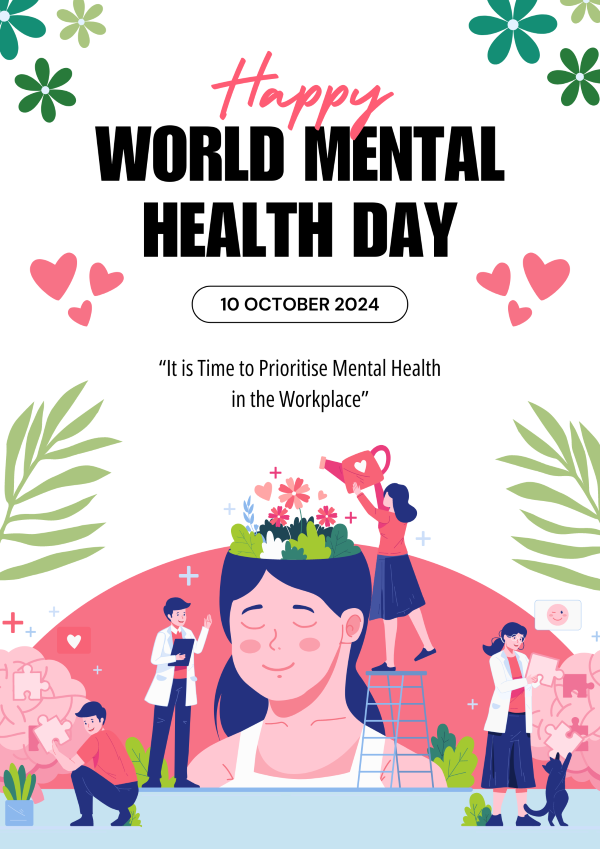When we see others in pain, it is often our first response to rush to their aid, empathetically sensitive and desperate to relieve them of their suffering.
When someone knicks their finger with a knife, we waste no time wrapping the wound, quick to cease the gushing bleeding.
When someone is sprawled out on the couch with a swollen ankle, we forage in the freezer for a numbing ice pack to soothe the inflammation.
When someone claws at an itchy, red rash caused by an allergic reaction to a sharp wasp sting, we don’t hesitate to slather the irritated skin spot in cooling ointments and creams.
However, sadly, one of the most brutal pains that often goes unnoticed and untreated, stranding its victims to suffer alone in silence and isolation, is a pain that can’t be physically seen—Mental anguish.
World Mental Health Day is a day that strives to shatter this sad reality where internal pain is buried deep beneath the surface, invisible and ignored.
When is World Mental Health Day?
World Mental Health Day is on 10 October every year.
This year in 2024, World Mental Health Day falls on a Thursday.
What is World Mental Health Day?
World Mental Health Day is an annual observance aimed at raising awareness and promoting mental health and well-being around the world.
The day provides an opportunity for individuals, communities, and organisations to come together to focus on mental health issues, reduce the stigma associated with mental health conditions, and advocate for better mental health care and support systems.
First established by the World Federation for Mental Health in 1992, World Mental Health Day has since gained significant global recognition.
Each year, the day is centered around a specific theme or topic related to mental health, and various activities, events, and initiatives are organised to address the chosen theme. These may include educational programs, awareness campaigns, workshops, and discussions designed to promote understanding and action on mental health issues.
Ultimately, the goal of World Mental Health Day is to emphasise the importance of mental health in our lives and to encourage individuals and communities to take steps to improve mental well-being, seek help when needed, and support those dealing with mental health challenges. It serves as the perfect opportunity to advocate for policies and resources that can enhance mental health services and support for all.
What is the World Mental Health Day 2024 Theme?
The WMHD 2024 theme is “It is Time to Prioritise Mental Health in the Workplace,” marking the World Federation for Mental Health’s 76th year of raising awareness and advocating for mental health.
As we spend a significant part of our lives at work, mental health in the workplace has become a critical topic. Whether you're an employee or employer, creating a supportive, healthy work environment should be a top priority. After all, a happy, balanced workforce isn’t just beneficial for individuals—It’s great for business too!
This year's theme shines a light on the growing need for companies to address mental health challenges like stress, burnout, and anxiety that affect so many employees. It’s about understanding that mental well-being is just as important as physical health and should be treated with the same care and attention. From managing workplace stress to promoting open conversations around mental health, the goal is to create workplaces where mental health is prioritised, protected, and promoted, fostering environments where everyone can thrive.
Useful Mental Health Awareness Tips and Ways to Practice Self-Care in our Daily Lives
1. Give Yourself Grace
It’s true what they say—We are our own worst critics. Constant self-criticism, however, can take a toll on your mental health and is more destructive than helpful. Remember that nobody is perfect, so give yourself the grace and credit you deserve. Take time every day to recognise the positive attributes that make you the unique individual that you are, as well as the accomplishments you’re proud of, whether big or small. By aiming for progress rather than perfection, you are able to set attainable goals that allow you to appreciate who you are and what you are capable of.
2. Make Time for the Things That Make You Happy
Part of maintaining good mental health is setting aside time for yourself and the things in life that make you happy. Much like the way that you dedicate time to your loved ones, encouraging them to pursue their own happiness, you must do the same for yourself. If you enjoy being in nature, go for a short stroll around the lake. Watch an episode of your favourite show, bake a pie, soak in a relaxing bubble bath, or paint—Whatever it is that makes you happy, make a little time for yourself every day to the things you love.
3. Practise Positivity
It is easy to focus on the negative, rather than looking at the positive, especially when you get caught up in overwhelming emotions such as anger or sadness. However, dwelling too much on the grim bits of your life can cause you to be consumed by negativity, missing out on all of the positive parts. Contrary to what some people may think, being positive doesn’t mean plastering a fake smile on your face and morphing reality into a fairytale. Being positive simply means adjusting your perspective on reality by focusing on the positive side, instead of the negative. Whenever you find yourself bombarded with negative thoughts or emotions, take a moment to challenge them by shifting your point of view of the situation to a more positive outlook.
An Example of Countering Negative Thoughts:
Situation: You are moving to a new city.
Negative Thought: “I hate moving. I don’t know anyone there. I’ll have to start everything all over again.”
Positive Thought: “This move is an opportunity for me to meet new people and make new friends. I will get a fresh start and gain a lot of new experiences.”
4. Don’t Overload Yourself
It’s easy to overload yourself with too many commitments because oftentimes, saying “yes” to a person seems less problematic than saying “no.” However, taking on too many tasks can leave you feeling stressed, overwhelmed, and irritable, only leading to burnout. Instead of taking on a million tasks, commit to a few that you can reasonably handle without neglecting yourself.
5. Remember to Rest and Recharge
In order to be healthy both mentally and physically, it is essential that you give your body and mind the proper rest it needs to recharge. Without the necessary rest and recharging that your body needs, your overall health will suffer, leaving you feeling drained and irritable. This means that you must make sure that you are getting enough sleep, as well as setting aside time to rest and take breaks mentally.
6. Recognise the Things That You Can’t Control and Let Them Go
Although it is frustrating, there are some things in our life that we have absolutely no control over. This is something that we must acknowledge and accept for our own peace of mind. Rather than wasting your time and energy obsessing over the things that you can’t control, spend your time focusing on the things that you can control. This is a much more productive use of your time, as you can channel your energy towards creating positive change.
7. Nourish Your Mind by Nourishing Your Body with Food and Exercise
The mind and body are a team, so naturally, taking care of your physical health also improves your mental health. Nourishing your body with food that’s high in nutrients not only provides you with energy for the day but also helps fuel your mind. Similarly, when you exercise, your body releases chemicals known as endorphins, which trigger a positive feeling in the body and reduce the perception of pain in your brain. Besides the release of endorphins, exercise is also beneficial for decreasing stress, boosting self-esteem, battling anxiety and depression, and improving sleep. Remember that taking care of your mental health also entails taking care of yourself as a whole.
8. Stay Connected with Others—Don’t Isolate
When we go through a stressful or difficult time, sometimes isolating ourselves from others can feel like the right thing to do, especially when we don’t want to “burden” others with our problems. However, isolation from others only allows you to be completely consumed by negativity. Humans are social creatures that crave connection, so isolation often only makes the situation worse. Remember that we all go through tough times, and it is okay to lean on your friends and loved ones to help you get through them.
9. Make a List of What You’re Grateful For
Oftentimes in life, we get so caught up in what we don’t have that, rather than being grateful for what we do have. Whenever you feel consumed by negativity, take a minute to make a list of all of the things you are grateful for. Do you have access to food? Clothes on your back? A bed to sleep in? People that love you? Our lives may not be perfect or even close, but there are countless things in life to be grateful for if you take the time to notice them.
10. Ask for Help When You Need It—You’re Not Alone
Remember that we are all only human—All of us need help once in a while, and this is nothing to be ashamed of. Don’t be afraid to ask for the help you need, whether that means talking to a therapist or a trusted family member or friend. You are a person with value and purpose in this world, and there is always someone out there that cares about you and what you’re going through. You are not alone, and you can do this.
If you feel that you or someone you love is in danger or in need of professional help, please click here to utilise mental health services in New Zealand.
The Beauty and Importance of our Minds—Inspiring World Mental Health Day Quotes
“Mental health affects every aspect of your life. It’s not just this neat little issue you can put into a box.”
"I think it’s really important to take the stigma away from mental health… My brain and my heart are really important to me. I don’t know why I wouldn’t seek help to have those things be as healthy as my teeth."
"Vulnerability sounds like truth and feels like courage. Truth and courage aren’t always comfortable, but they're never weakness."
"You, yourself, as much as anybody in the entire universe, deserve your love and affection."
"There is hope, even when your brain tells you there isn’t."
“We would never tell someone with a broken leg that they should stop wallowing and get it together. We don’t consider taking medication for an ear infection something to be ashamed of. We shouldn’t treat mental health conditions any differently.”
"You are valuable just because you exist. Not because of what you do or what you have done, but simply because you are.”
“The experience I have had is that once you start talking about [experiencing a mental health struggle], you realise that actually you’re part of quite a big club.”
"Your mental health is everything – prioritise it. Make the time like your life depends on it, because it does."
"The most beautiful people we have known are those who have known defeat, known suffering, known struggle, known loss, and have found their way out of the depths. These persons have an appreciation, a sensitivity, and an understanding of life that fills them with compassion, gentleness, and a deep loving concern. Beautiful people do not just happen."

